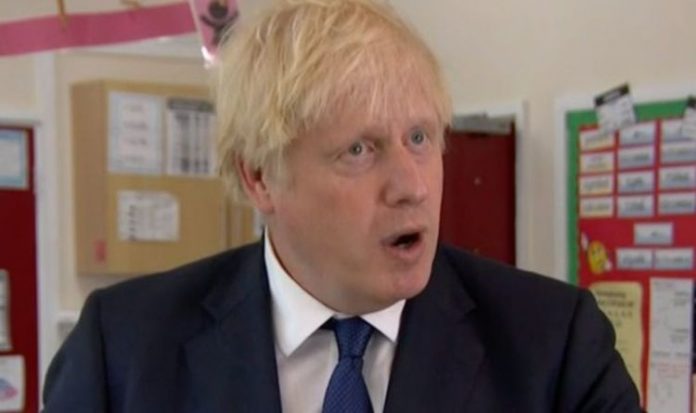Speaking during a trip to St Joseph’s school in Upminster, Boris Johnson said: “We’ve got a problem which is that there are people who want to come from around the world to this country because obviously it’s a great place to be. There’s no doubt that it would be helpful if we could work with our French friends to stop them getting over the Channel.
“Be in no doubt what’s going on is the activity of cruel and criminal gangs who are risking the lives of these people taking them across the Channel, a pretty dangerous stretch of water in potentially unseaworthy vessels.
“We want to stop that working with the French, make sure that they understand that this isn’t a good idea, this is a very bad and stupid and dangerous and criminal thing to do.
“But then there’s a second thing we’ve got to do and that is to look at the legal framework that we have that means that when people do get here, it is very, very difficult to then send them away again even though blatantly they’ve come here illegally.”
READ MORE: France vs UK: Britain’s tensions with French rise over migrant crisis
Britain’s Border Force brought migrants ashore in the port of Dover on Monday after picking them up from an inflatable boat as they crossed the Channel, the latest in a surge of crossings that is causing political tensions with France.
Taking advantage of a spell of hot weather and calm sea conditions, more than 500 migrants have made it to British shores since Thursday, many in overloaded rubber dinghies.
A Reuters photographer in Dover, on England’s south coast, saw a Border Force boat arrive carrying a group of migrants wearing life jackets, while a blue inflatable dinghy was towed in by a separate vessel.
British ministers have called the surge in crossings “unacceptable” and have called on France to do more to prevent boats from setting off from northern France.
“We have to make this route completely unviable,” said Chris Philp, the minister for immigration compliance, in a statement on Sunday. “We intend to return as many migrants who have arrived as possible.”
Pro-migrant charities accuse the government of over-reacting to the crossings for political gain, when the numbers are tiny compared with the flows of migrants routinely arriving in Mediterranean countries like Greece and Italy.
Many of the migrants come from Afghanistan, Iraq, Syria and countries in Africa, fleeing poverty, persecution or war. Some stand a chance of being granted asylum, while others, considered illegal economic migrants, are unlikely to be granted the right to remain in Britain.
The interior ministry has asked the military to help deal with the migrant boats, although it has not explained what it wanted them to do.
Philp is due to travel to Paris this week for talks with his French counterpart.
The French interior ministry says it has already deployed extra resources and that large numbers of boats are being intercepted before they cross.
DON’T MISS:
Brexit will NOT ‘make any difference’ in stopping Channel crossings [INSIGHT]
Border Force intercepts dinghy ‘with 12 migrants on board’ [VIDEO]
English Channel: What happens to migrants found in English Channel? [ANALYSIS]
Pierre-Henri Dumont, a member of the French parliament representing the Calais area, just across the Channel from Dover, dismissed the idea of calling in the navy as an attempt by British ministers “to show some kind of muscle”.
“My question is: what for? If a small boat full with migrants is entering the British waters, is the British navy going to shoot at them?” he said in a BBC interview.
“We’re talking about human beings, we’re not talking about cattle,” he said. “First we need to save lives.”
Dumont said it was unrealistic to expect France to stop every single crossing, as there were 300 km of coastline to monitor and it only took a few minutes for any group of migrants to embark and set off.
Britain left the European Union in January and is currently in a transition period with most EU accords still in force.
Dumont said that when the transition ended on Dec. 31, Britain would no longer be able to send migrants back to EU countries.
“That will cause a huge increase in the number of migrants trying to cross the Channel again,” he said.







